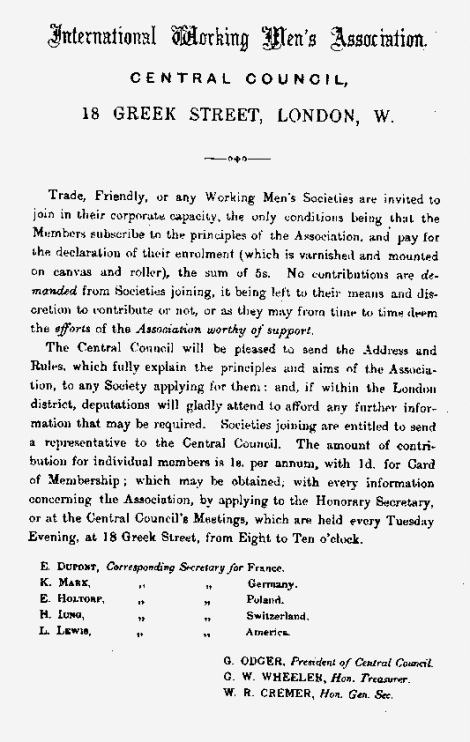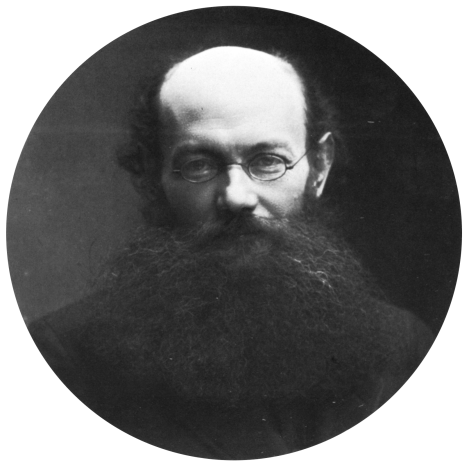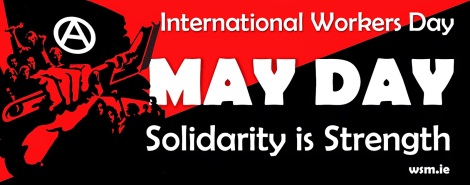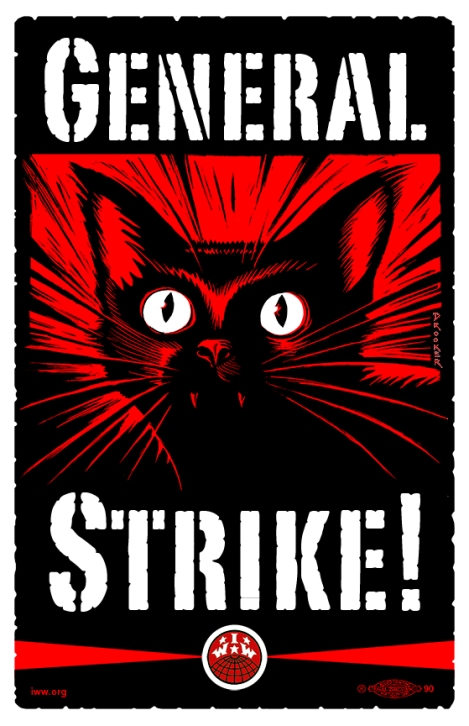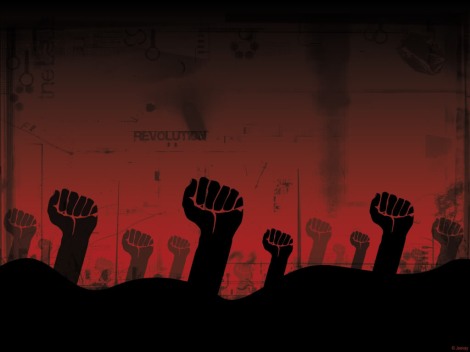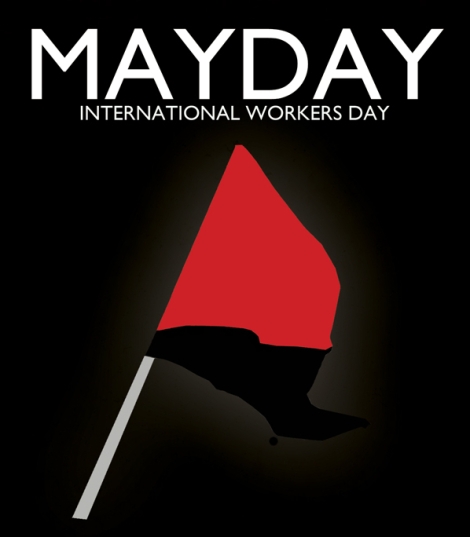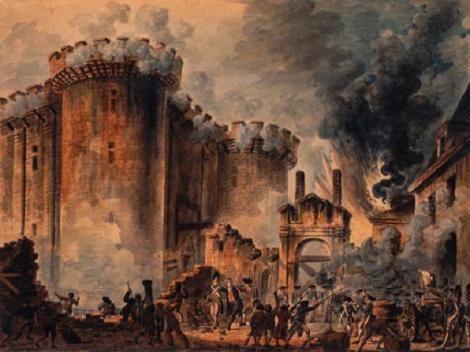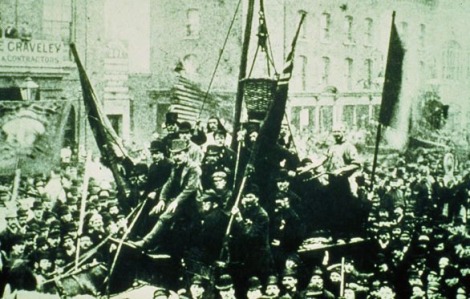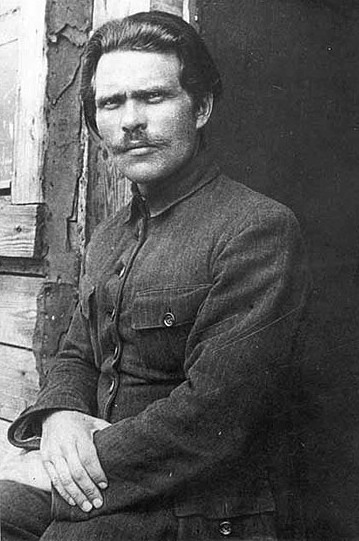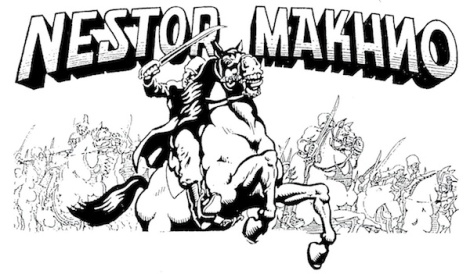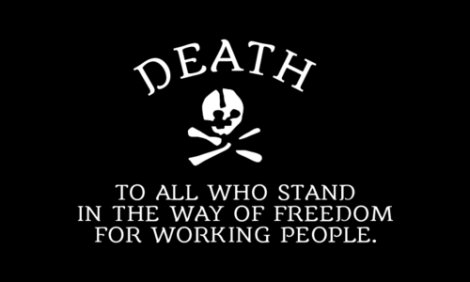
Autonomous Action
Recently, I posted an analysis of the situation in Ukraine by the Russian anarchist group, Autonomous Action. Here I present a statement of principles by Autonomous Action, to give a flavour of contemporary anarchist movements in Russia. I included material from Russian anarchists in all three volumes of Anarchism: A Documentary History of Libertarian Ideas.

AUTONOMOUS ACTION: WHO ARE WE
Autonomous Action – it is a community of people, for whom “freedom without Socialism is privilege and injustice, and Socialism without freedom is slavery and brutality” [Bakunin]. We consider that the most important things in life are not the consumption of goods, making a career, reaching positions of power and making money, but creativity, real human relations and personal liberty. All of us, be it workers and the unemployed people, students and pupils, employees and marginal elements, have one common unifying element – to protest against any power of a man over another man, state, capitalism and officially spread bourgeois “culture”. A desire not to be a willful nut in the mechanism of the System – to collectively resist it, to demand free self-realization.
OUR IDEALS AND OUR AIM
Autonomous Action against any form of domination and discrimination, both within the society and in our own organization. The current system of domination is tightly interlaced with a repressive state apparatus, industrial capitalist economical structure and authoritarian and hierarchic relations between people. We see that every state is an instrument of oppression and exploitation of the working majority for the benefit of the privileged minority. Power of state and capital is suppression of personality and creativity of each and everyone. This is why for us libertarian (free, stateless, self-governed) communism, a society without domination, is the necessary structure of society. The closest aim of Autonomous Action is to create a tradition and basis for a new humanist culture, social self-organization and radical resistance against militarism, capitalism, sexism and fascism.
HOW WE ARE ORGANIZED
Our goals may be reached only when aims and means meet. This is why our organization has a federative structure, which excludes leadership and hierarchy, denies inequality of the participators, centralism, strict division of functions, which ruin initiative, destroy autonomy and suppress personality. Our ideals and organizational principles are wide enough not to make us a sect, and concrete enough to allow co-ordination of actions, common tactics and aims and successful decision about tasks we engage in. Our structure,conditions of membership and mechanism of decision-making are defined in detail in the organizational principles of Autonomous Action.
HOW WE TAKE ACTION
Members of Autonomous Action support direct action. In order to reach our goals, we do not participate in the fight for power, for a seat in parliament or for arm-chairs of state officials. We realise our goals in direct order, by a wide spectrum of non- parliamentary and cultural action, if necessary revolutionary by form and content. Autonomous Action is a common front, subdivisions of which, each in their own directions, realise an attack against repressive relations in different social movements, in all spheres of social and individual life – at the same time building new relations, without domination and submission. Autonomous Action recognises the right of society and individuals to defend themselves and to resist against exploitation.
WAY TO OUR GOAL
We recognise a multitude of ways to reach our goals. The way might be one of revolutionary insurrection self-organised by the working masses, a general strike or a more or less gradual disappearance of the institutions of power and capital in favour of self-governing structures of alternative civil society, and so on. Life itself will define, which of the methods will be most effective and timely. But a society without domination may never be reached through reforms and legislative acts of parliaments and governments, initiatives of inter-state and corporate structures, representatives of the privileged and the ruling class. Our strategy is REVOLUTIONARY in the sense that it comes from below, from the very bottom structures of the society, and does not operate with the mechanisms and resources of the system; in the sense, that it does not demand partial changes in the system, but its destruction and change as a whole.
OUR ALTERNATIVE
Centralised bureaucratic machine, national and global capital and the consumerist mass culture which they have given rise to, that is the system suPpressing us, and it’s not only immoral and unjust, but it also leads the present human society to an ecological and cultural catastrophe and to war. Sharp change of direction has become an urgent necessity today. This is why we propose a radical alternative to existing order of things, based on humanism, liberty and equality. Our goal is not to “set up a divine kingdom on Earth”, but only to open a road to real social development. In such a society some of the present problems may remain, and some new may appear, but it will in any case be more equal, human and free than the present one, and in certain circumstances, becomes almost the only alternative to approaching catastrophe. Simultaneously, our alternative is not only a goal of the distant future, for which we are fighting for, but a society which we are creating here and now through everyday resistance. This alternative is fixed by the following ideals and directions of our activity, which every participator of Autonomous Action expresses according to his will, whereas her or his actions comply with goals of Autonomous Action and do not contradict the ideas of this manifesto.

IDEALS AND DIRECTIONS
ANTI-AUTHORITARIANISM
Against every form of dictatorship, leadership, authoritarism, centralised bureaucratical apparatus, police excesses. For right to participate in making decision on any question influencing our destiny. For minimisation of vertical and maximisation of horizontal relations inside the society. For decentralisation of the governance, local autonomy, direct grassroots democracy and federalism. For free federation of self-governed, but interconnected individuals, groups, communes, regions where organs of the co-ordination, when they are necessary, are independent councils or other institutions of social self-governance, formed by assemblies not according to principle of presentation, but according to principle of delegation and imperative mandate – with the right to immediate recall delegates. FOR COMPLETE LIBERATION OF EACH AND EVERYONE! YOUR FREEDOM IS SENSELESS WITHOUT FREEDOM OF THE OTHERS!
ANTICAPITALISM
Human race, undivided in its natural state, has become divided between masters and powerless exploited majority. We stand for liquidation of the class society, wage work, humiliation and exploitation of human by another and imperialism, and for elimination of power of money and products. Against the dependence of human from the nature of “market relations”. Products should not govern people, in contrary people should use products sensibly and cautiously. Society should get over the catastrophical logic of the bourgeois production. Against growing power of transnational corporations and international structures of the capital. For workers’ governance and control in production. The wealth and resources of society should be accessible to everyone, not only to the governing elite. For people’s self-governance without capitalists and bureaucrats. Organisation and integration of the production should be made according to the principle: from everyone according to their capacities, to everyone according to their needs – taking into account transformation in the structure of needs themselves, and keeping in mind the production limits given by the society and saving the equilibrium and diversity of nature. Capitalism, as a system of all out war, profiting and humiliation has only one historical perspective – death of humanity and planetwide ecological catastrophe. And in the best case, immersion to gulf of “civilised” barbarism. Capitalism may not be reformed.
ANTI-FASCISM, ANTI-NATIONALISM
Fascism, racism and nationalism are means of bourgeoisie and bureaucracy to provoke people against each other, and to divide them to different races and nations, to hide mastership. To create profits and maintain power of bourgeoisie and bureaucracy over the society. We are internationalists. Only organising workers in international scale may not only challenge power and capital and reactionary political tendencies, but also to give them a decisive death blow. World should be multi-coloured, not brown! For a world without borders and national states, one in it’s multitude of cultures and traditions. For a world with multitude of personalities, collectives, communities and regions, no to a downcast world of national and religious hatred, racial prejudices, chauvinism, xenophobia, unified and closed “national culture”. For protection of national and cultural minorities against discrimination and fascist terror. For radical counter-attack against neo-nazis and national-patriotist ideologists and organisations. For foundation of anti-fascist shock troops to physically confront fascists.
ANTI-BOLSHEVISM
Negative experience of “real socialism” in countries like USSR, China, Cuba etc. does not in any case discredit ideas of libertarian communism. It is not possible to create free society and solidarity through authoritarian party structure seizing the state power, with dictatorship of any party apparatus or self-appointed “avant-garde”. Against Bolshevik principles of the organisation. For organisational structure, based on libertarian principles of mutual respect, equality and solidarity. Organisational structure should be image of things to come in the society, foundation of which we are trying to reach. We see, that regimes in so called “socialist states” were nothing but rude form of global tendency towards state-capitalism, a system in which bourgeois economical relations, wage labour as well as psychology remain. The only difference was that capitalist was one and collective – the governing party elite. Only difference between “socialist” and “western” capitalism was the form of capitalist accumulation. Libertarian experience of the Makhnovist movement, Spanish revolution, Tolstoyanism, independent labour movement etc. showed with which zeal Bolsheviks try to root out any anti-authoritarian, really communist movement. We are against any ideal and organisational unity with Leninists (Stalinists, Maoists, trotskists etc.). For close co-operation with non-authoritarian socialists, anti-party left communists and libertarian Marxists.

SELF-GOVERNANCE
Forms of self-governance may be a) means of production seized by the workers to become common property, functioning with libertarian model of organisation; b) libertarian communes; c) other institutions, founded on regional, functional and other principles.
Such forms of self-governance could be effective method to found the basis of social alternative to the present society.
ANTI-MILITARISM
Against state army as a system of violence, instrument of governance of ruling class and instrument of integration of young men to patriarchal, authoritarian and hierarchical systems of domination. Against forced conscription. We should not defend state and government, which only exist in order to humiliate us. Boycott military call-ups! Trash all draft cards! For an alternative of general armament of workers and people’s militias, without hazing, humiliation of human dignity and prison regime. For full control of the society over military specialists. PEACE TO THE WHOLE WORLD! FREE PEOPLE DO NOT HAVE TO DIVIDE IT!
ECOLOGY
Against non-sustainable exploitation of the nature for profit of the few. Against industrial system of organisation and power of the technocrats. For development from all directions and inculcation of the alternative technologies. For foundation of ecological settlements and harmonisation of the relation between human and the nature. For decentralised, humanist, balanced production for interests of the people, with protection of the environment for the future generations, with gradual abolition of the industrial technologies. Active support to social ecologists in their struggle, participation to ecological actions and campaigns. NOT MORE, BUT BETTER! NOT EXTERNAL, BUT INTERNAL! NOT TO OWN, BUT TO BE!
FEMINISM
Against sexism – humiliation, violence and discrimination against women and men based on their sex. Against patriarchy – authoritarian structure of any class society, where mostly proprietor-men have power in all key spheres of the society, “female” is always subordinated to “male”, and family has a function of of reproduction and socialisation of the labour power. Against sexist stereotypes, family despotism, homophobia, porno industry and ageism (discrimination on the basis of the age). For active participation of the women to the life of the society, and possibility of individuals themselves to control their own bodies (and reproduction in special). Every human is equal and unique socially, sexually (in her/his gender) and age.
NEW HUMANIST CULTURE
Against hypocrisy and repression of the official mass culture, commercialisation of the creativity, power of the show-business and “amusement industry”. Against manipulation of the conscience and behaviour of any kind and form. Against elitism of the culture and hierarchy of its institutions. Global support to any kind of uncommercial creativity, experimental art and pedagogic. For support of the initiative of people, who already now want to live according to unauthoritarian principles. This kind of initiatives are important not only for escape from the reality, but also to gather experience of free and sensible relations. For foundation of squats, housing collectives, artist communes, autonomous cultural and information spaces, organisation of mass festivals of alternative culture. CULTURE SHOULD NOT IMPOVERISH OUR LIFE. LIFE SHOULD BECOME BIGGER THAN IT IS!
ANTI-CLERICALISM
We, without conditions, support full “freedom of spirit”, for every man’s free search of world outlook and faith. But we should do our best to resist, without using mechanism of rule, those ideological systems which bring hatred, xenophobia, nationalism in society and transfer individual to an authoritarian and dogmatic person. Many religious ideas are connected to such kind of systems. Even more resolutely we are against hierarchical church organisations, pyramidal and authoritarian structure of which may not serve interests of liberation of human individual. Such churches serve only one goal – fortifying human both physically and in spirit. One of the most serious and powerful churches of such kind in Russia is the Russian Orthodox Church, which already long time ago transformed into a powerful capitalist and bureaucratic corporation, receiving from the state both financial and ideological advantages. Against using needs of man for explanations about universe in the interests of business and power.
HOW TO START RESISTANCE?
Do not wait, take action yourselves. Concentrate your efforts to any direction you desire and feel close to yourselves. Find adherents among your friends, work- or schoolmates. Start from little, main thing is that you have some real issues to organise, such as publication and distribution of papers, formation of worker’s unions, organisation of squats, communes, alternative information centres or participation to a strike, anti-fascist struggle, protest camp, meetings, pickets or rock-concerts. The main thing is to take action, not to be based on the state or bourgeoisie, to take action against them and independent from them. It is necessary to connect other groups and initiatives, maintain informational and organisational connections to adherents in the whole country and abroad. That brings you confidence and power. Send materials about your life and struggle to our paper “Avtonom”, which covers struggle in the whole libertarian sphere. BE COURAGEOUS! LIVE FULLY, FREELY AND STRONGLY! RESIST! REMEMBER, THAT A SMALL GROUP OF FIGHTERS MAY START AN AVALANCHE!
AUTONOMOUS ACTION

“Anarchy is Good”


